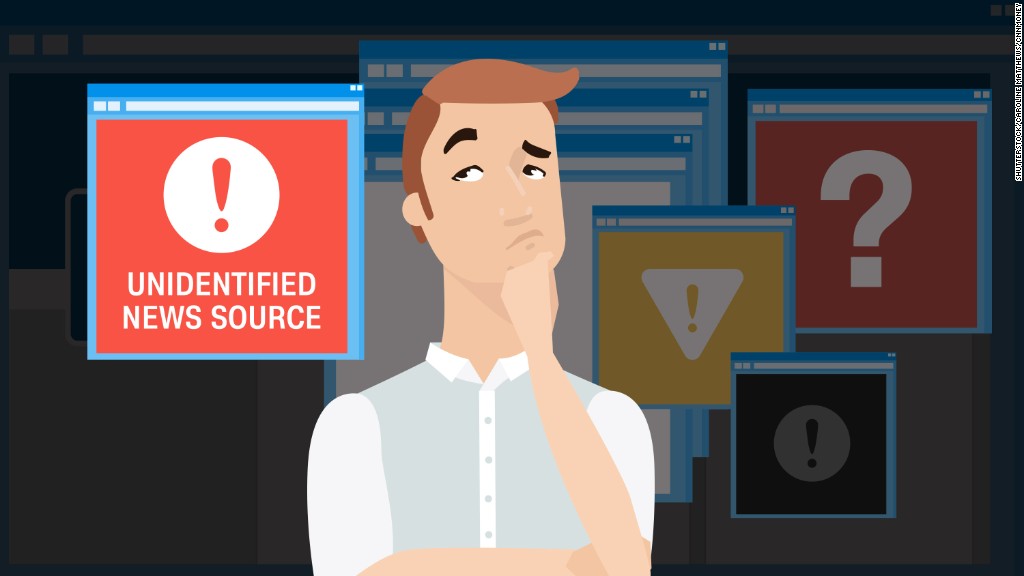
As Facebook introduces "fake news" warning labels, the social network faces a fundamental problem: Some of its users don't trust the fact-checkers.
There was an immediate uproar, led by right-wing web sites, when Facebook announced the labeling plan on Thursday.
Some of Facebook's partners were denounced as partisan, partly by writers and commentators who are partisans themselves. It's the continuation of a long-running online fight about fact-checking in the age of information warfare.
The overarching fear expressed by some of the writers is that what begins as reasonable flagging of hoaxes could devolve into damaging cover-ups of conservative political opinions.
Facebook (FB) says it is moving carefully and taking steps to ensure that the warning labels are not misused.
But even before the labels started to show up on the social network, The Drudge Report's banner headline about the Facebook plan was "RISE OF TRUTH POLICE!" The headline linked to a story on Infowars, the conspiratorial web site led by far-right-wing host Alex Jones. The Infowars story predicted that Facebook would probably "use the new feature to blacklist information that runs contrary to any mainstream media narratives."
Related: Facebook to start putting warning labels on 'fake news'
Jones tried to connect the labeling effort to the CIA and the United Nations.
By Friday, the notion that Facebook's warning labels would be part of the "fake news" problem, not the solution, permeated many right-wing sites. Some sources raised the prospect of involvement by liberal billionaire George Soros.
Facebook's response was to refer back to what CEO Mark Zuckerberg said in a Thursday afternoon Facebook post. "I understand how sensitive this is and I have instructed our team to proceed carefully and focus on fighting spam, not flagging opinions," he wrote.
The plan calls for "flags" to be appended to 100% bogus stories shared by users. A popular made-up story during the election, saying Pope Francis had endorsed Donald Trump, would be accompanied by a red label that says "disputed by 3rd Party Fact-Checkers."
Facebook says it is not deciding what's true or false. The deciders are fact-checking groups that have committed to the International Fact Checking Code of Principles, which was recently established by Poynter.
Related: Facebook won't help build a Muslim registry
"We'll use the reports from our community, along with other signals, to send stories to these organizations," Facebook VP Adam Mosseri said Thursday. "If the fact checking organizations identify a story as fake, it will get flagged as disputed and there will be a link to the corresponding article explaining why."
So the focus of criticism is on the selection of those fact-checkers.
Breitbart's headline on Thursday was "MASTERS OF UNIVERSE DECREE: WE DECIDE WHAT'S 'FAKE NEWS.'"
Breitbart received widespread attention during the 2016 election for its support of Trump's candidacy. On Thursday it wrote that Snopes, ABC News, Politifact, and FactCheck.org all "have records of left-wing partisanship."
PolitiFact responded to the dust-up in a series of tweets on Thursday.
"If you don't know us, we're neither liberal nor conservative. Our simple goal: Check facts. We always list sources, explain reasoning," the group said. "Make sure your read our fact-checks for yourself before you decide if we are biased or not."
The conservative media watchdog group NewsBusters responded by referencing PolitiFact's "pants on fire" designation for falsehoods: "PANTS ON FIRE. You're liberals and liberal journalists love painting you as nonpartisan."
Related: Trump sits down with top Silicon Valley execs
Another right-leaning site, The Federalist, published a list of "five major problems" with Facebook's efforts, including "PolitiFact is a joke."
Skepticism of fact-checkers permeates the right. Zuckerberg alluded to this on Thursday by saying, "We'll keep looking for unbiased third parties to add to our list of reviewers."
The question is whether there are any agreed-upon "unbiased third parties."
Zuckerberg, echoing other Facebook officials, said "this is an early test," and he said "I'm going to keep a close eye on it."
At least one prominent conservative voice, Brent Bozell, the president of the Media Research Center, said he had been in communication with Zuckerberg about it. "Zuckerberg assured me that his express aim is to eliminate only patently false news stories from Facebook," Bozell said.
"He underscored he has instructed these organizations to focus only on truly fake news and nothing of a political nature. I will accept in good faith his commitment to address our concerns on this matter," Bozell said in a statement. "It is my hope this will be the last we say about this issue."


